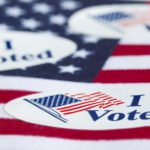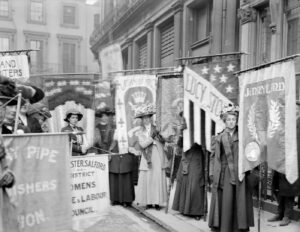Modern conservatism began with Edmund Burke’s critique of the European left’s dogmatism about rights, of its treatment of rights as political absolutes demanding unimpeded application, without the mediation of prudence and a concern for the operation of such rights on the common good. This critique is still relevant today, and is nowhere more relevant than in relation to the contemporary American left’s doctrinaire veneration of the right to vote. This veneration goes beyond a reasonable defense of the equal right to vote of all citizens and extends beyond reason to an insistence that the right is violated, or at least improperly impeded, unless the laws make voting as easy as possible.
This dogmatism has shown itself most recently in reaction to the efforts of Republican legislators, concerned about voter fraud, to make voter registration procedures more demanding and to require photo identification when voting. A fair sample of the liberal reaction to such policies can be found in an article by William Galston in the New Republic. Galston’s title: “Dismantling the GOP’s Odious Philosophy of Voter Suppression.”
It is worth noting first that the regulations which Galston repudiates do not deserve to be labeled voter suppression. They can equally be understood as a defense of the right to vote. After all, it is obvious that any fraudulently cast ballot undermines someone’s legitimate right to vote. If a citizen votes more than once, or if a non-citizen or unqualified citizen votes at all, then he diminishes the political authority that other citizens are by right supposed to have.
More to the present point, however, is that the liberal veneration of the right to vote overlooks the Burkean admonition that any right, no matter how highly esteemed, must be exercised under the direction of prudence if it is truly to redound to the public good. Liberals assume that because the right to vote is generally a good thing, its unfettered exercise will necessarily produce good effects for the community.
This, however, is magical thinking. There is nothing in human experience to confirm such a supposition. On the contrary, ordinary daily experience teaches us that our society, like any other, contains a certain percentage of citizens—small, to be sure, but not insignificant—who are careless and thoughtless even in relation to their own and their families’ interests. There is no reason to expect that such citizens would show any more diligence or sense of responsibility in their use of their right to vote.
Start your day with Public Discourse
Sign up and get our daily essays sent straight to your inbox.Nor is it the case that such negligent voting carries no costs for anyone else. We think of the right to vote as part of our liberty. But as Burke observed, liberty in bodies of men is power. Voting is not just an act of self-expression but an exercise of authority over others. In closely contested elections, it is very possible that the outcome will depend precisely on the votes of the least informed and interested citizens. Can we really place the fate of the country in their hands in such situations, while maintaining a blind confidence that all will be well?
Beyond the bad consequences that might arise in particular elections, it should be observed that the ongoing participation of such voters will tend to degrade the quality of public discourse and thereby diminish the chances of good political outcomes. The presence of such voters, and the continuing possibility that they may determine any given election, will lead candidates for office to seek out their votes. But politicians, out of understandable self-interest, ordinarily seek the easiest and surest way to winning votes. Since ill-informed and careless voters are more likely to respond to mere slogans and appeals to narrow or temporary self-interest, politicians will be habituated to making these appeals. And since they can only be made in public view, the use of such appeals will habituate all voters to their use and perhaps even to responding to them favorably. No one can look upon such a spectacle and think it simply unproblematic by the magic of the legitimacy of the right to vote itself.
None of this is to say that the right to vote should be denied to any American citizen who is legally authorized to cast a ballot. It is rather to adopt a properly realistic appreciation of the right to vote—to recognize that the right, although proper, cannot be expected to be exercised perfectly by flawed human beings or to lead on its own to good outcomes in all cases. These reflections point not to a denial of the right to vote, but instead to prudent regulations designed to foster responsible and thoughtful voting—for example, registration procedures that require voters to show, by meeting a reasonably advanced registration deadline, that they have been thinking about their choice in the election longer than one day or one week before it arrives.
American liberals indignantly denounce such regulations as “voter suppression.” Perhaps they would see their legitimacy if they reflected that our society commonly embraces regulations designed to improve the use of a right, even if such regulations inadvertently but inevitably somewhat burden the exercise of the right.
For example, most liberals believe in a right to abortion. Nevertheless, the Supreme Court has held that society has a reasonable interest in encouraging the responsible exercise of that right—making sure, for example, that women do not elect to have abortions impulsively or in the absence of full information. Thus, in Planned Parenthood v. Casey, the Court upheld an informed consent law, which required women seeking abortions to be made aware of the development of their unborn child, and to undergo a brief waiting period. Such regulations, the Court held, cannot reasonably be understood as improper deprivations of the right to abortion, since a woman could ordinarily fulfill the requirements of the regulations and then have, or not have, an abortion at her own decision.
Of course, contemporary American liberals are very protective of the right to abortion, and not a few of them view even the mild regulations upheld in Casey as unacceptable. The legitimacy of regulating the use of a right, even to the point of mildly impeding its exercise, might be seen by liberals if they consider a case in which they are not as favorably disposed to the right in question.
Take, for example, the Second Amendment right to keep and bear arms. The right itself has an indisputable constitutional basis. Many liberals concede its legitimacy, even while contending for gun regulations that are intended to encourage more responsible gun ownership, and even when those regulations place some burden on the exercise of the right. Requiring potential gun owners to submit to background checks or waiting periods, or to complete courses in gun safety are all defensible ways to prevent the right to have guns from being abused, and their inevitable consequence is to lightly burden the exercise of that right even by reliable and upright citizens. Just as such requirements need not be viewed as “suppression” of the right to bear arms, so strict registration requirements need not be viewed as “voter suppression.”
If it is justifiable to ask for informed consent to an abortion, or to require that gun owners have knowledge of gun laws and gun safety, why would it not be equally justifiable to ask voters to show, or at least to encourage them to acquire, the civic knowledge necessary to cast a properly informed ballot? Here we inevitably touch on a matter of great delicacy. To mention the possibility of linking voting to a test of civic knowledge inevitably calls to mind the “literacy tests” that were in the past used to disenfranchise African Americans in some states. The country very understandably turned against such tests in light of the racist ends to which they were turned. But the fact that such tests were used as tools of racial discrimination does not change the fact that tests of civic literacy—in themselves, when applied fairly—need not be incompatible with a genuine commitment to democracy and respect for the right to vote.
In pure theory, one might contend that the right to vote should be conditioned on some level of civic literacy. After all, how can a voter ignorant of the rudiments of our political system be understood to be advancing any reasonably calculated ends, even his own, by casting a vote on the basis of what may be wildly inaccurate presuppositions about the institutions his vote is designed to influence? Moreover, if we require some civic literacy for aliens to become citizens, how would it be incompatible with democracy to require those who are already citizens to demonstrate such knowledge before exercising the most important powers of citizenship?
Such considerations, however, are and should remain purely theoretical. In view of our disgraceful history of racial discrimination in voting rights, and the still tender wounds associated with it, it is certainly prudent to steer well clear of any policy that conditions the right to vote on passing any kind of test. Nevertheless, making all such reasonable concessions to understandable concerns about the abuses of our past, it certainly would not be wrong to ask citizens not to pass such a test, but simply to take it, at some point before casting the ballot. The results of such a test need not be used to deny anyone the right to vote, nor be made public in any way, but could simply be reported confidentially to the individual voter. Moreover, the burden imposed by such a test, while real, would be slight. Voters would have to take the time to sit for the test at some point before the election. Such a test would undeniably inconvenience voting more than mere registration requirements do, but not to the extent of depriving anyone of the right to vote who exercises ordinary diligence.
But if the right to vote were not to be denied, what would be the purpose of such a test of civic literacy as part of registration? The point would be for the law (non-coercively, without denying any right) to educate citizens in the importance of responsible voting, of political participation informed by genuine knowledge of our political institutions. We are too cynical if we assume that voters who perform poorly on such a test would simply ignore it. Most would surely vote anyway, but not a few would also take their results seriously enough to make some efforts to improve their civic literacy. This effect could not be other than beneficial to the quality of our democracy. And beyond its impact on voting, such a policy would serve as a welcome reminder of something we are more and more inclined to forget: that we must be responsible in the exercise of our rights if they are to be a blessing to ourselves and our fellow citizens.










